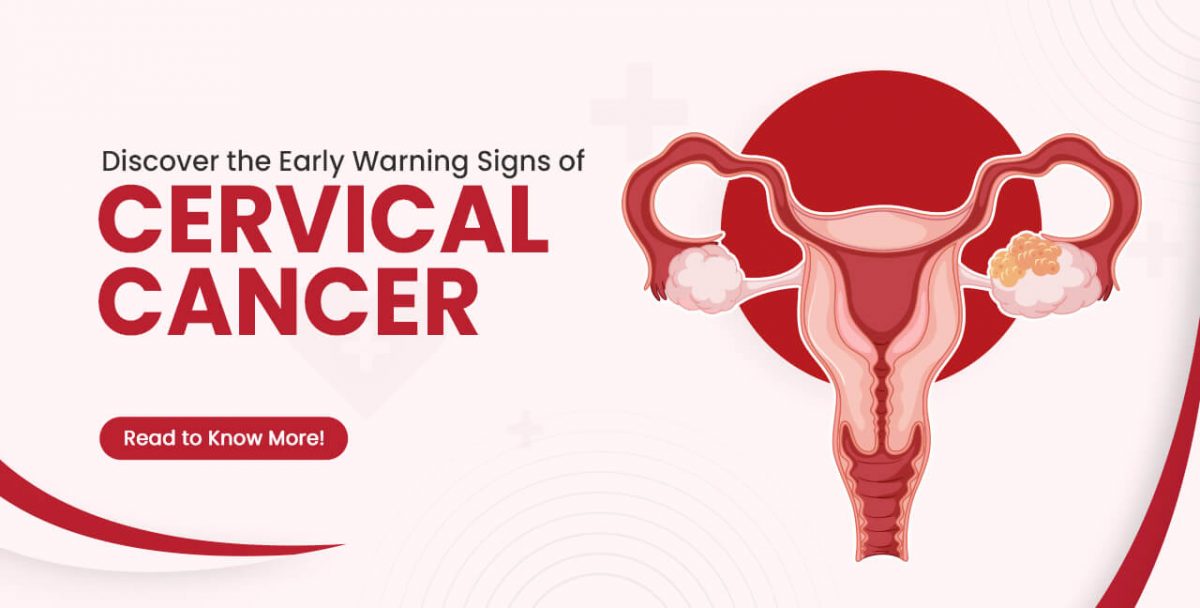
The cervix is the lowest section of the uterus. It resembles a donut and links your uterus to the opening of the vagina. It is covered in cell-based tissues. These healthy cells are what can develop into precancer cells. Cervical cancer or cancer of the cervix originates on the surface of your cervix. It occurs when the cells on your cervix start to transform into precancerous cells. Although not all precancerous cells progress to malignancy, identifying these cells and treating them before they become cancerous is crucial to preventing cervical cancer.
Types of Cervical Cancer
Cervical cancer is classified into two types
Squamous cell carcinomas and Adenocarcinomas. Squamous cell carcinomas account for 80% to 90% of cervical malignancies, while Adenocarcinomas account for 10% to 20%.
Cervical Cancer Symptoms and Common Signs
Early stages of cervical cancer are frequently asymptomatic and difficult to diagnose. Cervical cancer symptoms may not appear for several years. The greatest strategy to avoid cervical cancer is to detect abnormal cells during cervical cancer screenings. Cancer symptoms and signs can help in describing a medical situation. A symptom or sign may be caused by a medical condition other than cancer, which is why patients should seek medical attention if they develop a new symptom or sign that does not go away.
Here are some Cervical Cancer Symptoms and Signs
- Watery or bloody vaginal discharge that may be heavy and can have a foul odour.
- Vaginal bleeding after intercourse or between menstrual periods and after menopause.
- Periods may be heavier and last longer than usual.
Symptoms of cancer spreading to adjacent tissues or organs may include:
- Difficult or painful urination, sometimes with blood in the urine.
- Fatigue, weight loss, and loss of appetite.
- A widespread sense of illness.
- A dull backache or swelling of the leg.
- Pelvic/abdominal pain.
Causes of Cervical Cancer
The virus HPV (Human Papillomavirus), which is transmitted sexually, is responsible for the majority of cervical malignancies. HPV is transmitted by sexual contact and can cause cancer. The majority of people will get HPV at some point in their lives and be unaware of it because their bodies battle the illness. However, if your body does not fight the infection, the cells in your cervix can become malignant.
Diagnosis and Tests of Cervical Cancer
Cervical cancer grows slowly and over a long period. The cells in your cervix go through a variety of changes before they become cancerous. Cells in your cervix that were formerly normal begin to appear irregular or abnormal. These abnormal cells may disappear, remain unchanged, or develop into cancer cells.
Most occurrences of cervical cancer can be detected with regular gynaecological examinations using a Pap test. A Pap test also known as a Pap smear is a test that gathers cells from the cervix. These cells are investigated for precancers or other abnormalities.
If your Pap test results are abnormal, more testing is required. This could involve an HPV test, which is a specialised test that looks for HPV infection in the cells of your cervix. Cervical cancer has been linked to specific forms of HPV infection.
If your healthcare professional suspects you have cancer, they may inspect your cervix and obtain a tissue sample for a biopsy. Many procedures, such as punch biopsy or endocervical curettage, can be performed to extract the tissue. In some circumstances, a wire loop or conization is employed to collect cervix samples for biopsy.
Overcoming cervical cancer requires courage, resilience, and the power of medical advances. Fighting against this condition needs a team effort and support from your loved ones. Apart from that, we have to promote awareness and provide steadfast care for a healthy future.9

 Call-an-Ambulance
Call-an-Ambulance



